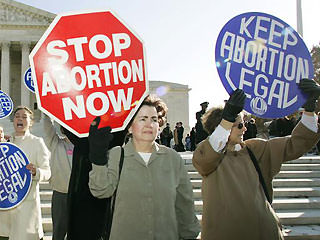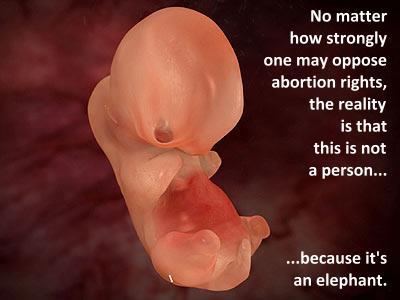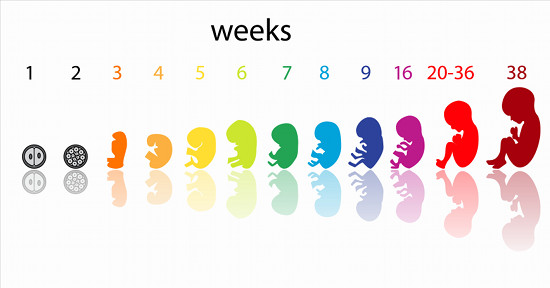“Life begins at conception” is a common phrase to encounter in discussions of abortion and related issues. Despite what those with short memories may genuinely believe, the issue of abortion and the view that it is murder have not been the views of most Evangelical Protestants for all that long (as we’ve been reminded recently in the posts on this topic by Fred Clark and Jonathan Dudley, among others).
 It was turned into an issue in order to manipulate people to vote for one party rather than the other. There is nothing more effective as a means to dissuade people from voting for a party than calling them “baby killers.” Unless, of course, one is dealing with an intelligent and well-informed populace that can see through such claims and resist being manipulated.
It was turned into an issue in order to manipulate people to vote for one party rather than the other. There is nothing more effective as a means to dissuade people from voting for a party than calling them “baby killers.” Unless, of course, one is dealing with an intelligent and well-informed populace that can see through such claims and resist being manipulated.
In the Left Behind series, and other similar apocalyptic works, born again Christians can see through the rhetoric and manipulative tactics of the Antichrist. So why is it that those same conservative Christians prove to be so gullible in real life? (And of course, their falling for the claim that Left Behind is a legitimate interpretation of Revelation is just one more example of that same problem. And so perhaps it is that very belief that being a true Christian will ensure that you are never duped by those who would seek to hijack your faith for political ends or personal gain, which sets you up to be manipulated in precisely those ways).
But let’s return to the topic of abortion, and the question of “when life begins.” If we are indeed talking about “life,” and nothing more, then one obvious Christian position might be to say that life begins at creation. The cosmos itself may deserve to be considered a living thing. But even if it is not, it gives rise seamlessly to living things which become other living things which eventually become us. And when we reach human beings, it could be argued that we are just a continuation of life that began before us, each of our beating hearts being like a torch passed from parent to child, from generation to generation. All our cells are living things, and yet the loss or renewal of an individual cell does not constitute the end of life. And from that perspective, life is a characteristic of two human beings, and all their cells, and the cell each contributes which then becomes the start of a “new life.” But we clearly don’t view all the cells involved in the same way. And it is worth asking why not.
 But what is typically meant by the phrase “life begins at conception” is that we are dealing with a human life, a person, from the moment of conception. And that is a problematic claim. A fertilized egg does not have a brain, and so does not have any of the thoughts, feelings, or other characteristics that we might appeal to in order to define personhood. Bringing the soul into the picture does not help. If a “soul” is present from conception, then do identical twins share a single soul? That seems to lead to conclusions that are bizarre.
But what is typically meant by the phrase “life begins at conception” is that we are dealing with a human life, a person, from the moment of conception. And that is a problematic claim. A fertilized egg does not have a brain, and so does not have any of the thoughts, feelings, or other characteristics that we might appeal to in order to define personhood. Bringing the soul into the picture does not help. If a “soul” is present from conception, then do identical twins share a single soul? That seems to lead to conclusions that are bizarre.
What we need to realize is that a fertilized human ovum has the potential to become a person. That is not the same thing as already being a person. The reason many choose to make conception the cut-off point is because any other is plagued with ambiguity and uncertainty. And I understand that. And as someone who has some experience with miscarriages, I know that when one longs to have a child, and the pregnancy ends spontaneously, it is tragic and heartbreaking. Yet those of us who have had that experience will probably agree that it is not the same sort of tragedy that one feels when a fully developed human being who has been born then has their life cut short. In our sorrow and mourning, as in our abstract thinking, we are (at least sometimes) capable of recognizing where situations are genuinely different. (Indeed, as Fred Clark points out, in cases of miscarriage, we lament and grieve more the further along a pregnancy was, indicating our capacity to appreciate that there is a gradation of tragedy in such cases.)
Abortion is a serious issue, and for that reason it is one that deserves to be talked about seriously. One can take the view that abortion early in pregnancy is tragic, without pretending that it is the same as murder – and indeed, in doing so, one would arguably be closer to the view in what little the Bible has to say about that topic.
But the rhetoric of “baby killers” being applied to all forms of abortion, as though the Bible actually said that human personhood begins at conception, is not a stance that is helpful or accurate. It exists largely in order to manipulate Christians to vote a certain way. If we are to actually create legislation that can be called “pro-life” – concerned with the unborn, concerned with the born, concerned with mothers, concerned with all human life – then we need to get beyond the manipulative rhetoric – and the unhelpful platitudes that become monstrosities when applied to rape victims, as at least two candidates learned this election season.
There’s an ironic twist to this topic. If the conservative Evangelical Christians who use the rhetoric I’ve referred to in this post actually believed one of their other rhetorical ploys, it would undermine the entire logic of the use of the issue of abortion to win their votes. Evangelicals are known to make the claim that all sins are the same in God’s eyes (I refer here, as I have been throughout this post, to popular views – often such views would be disputed or nuanced differently by those with greater knowledge of the Bible and theology or other relevant information). If they actually believed this, given that the Bible talks a lot about mistreating the poor and failing to help the needy, it would mean that there is no more reason to vote for one party than the other. One does one thing right, the other another, and neither has an advantage when it comes to sin.
But in actual fact, the Bible doesn’t make all sin equal, and it devotes far more attention to how we treat the born than to what happens to the unborn. But at the end of the day, we live in a different time, with different knowledge and perspectives, and so it is not a problem to view things differently than the Bible’s authors did. And so, to the extent that one considers abortion more tragic or more sinful than other things, then it would seem that one could adopt whatever course of action was necessary – even accepting and promoting the use of contraceptives – in order to reduce abortions. If that really is so important, then it should be treated as such.
My point in this post is this: The issues related to embryology and abortion are complex and difficult. They are important, and there are good reasons why these topics provoke strong feelings. My hope is that we can get past the rhetorical ploys (on both sides) and have serious discussion that neither simply assumes that fertilization of an egg somehow instantaneously marks the transition to personhood, nor assumes that as long as birth has not yet occurred, termination of a pregnancy is OK irrespective of reason and stage in development. A helpful step in this direction, I think, is Hemant Mehta’s post asking someone of a pro-choice perspective to explain and defend their viewpoint in response to direct questions.
What do readers of this blog think about this topic? When would you consider the point to be reached that a developing fertilized ovum, or embryo, or fetus, or baby, becomes a full-fledged human being? How do you explain and justify your view to others who disagree with you? How, if at all, can we improve the nature of the discussion?













